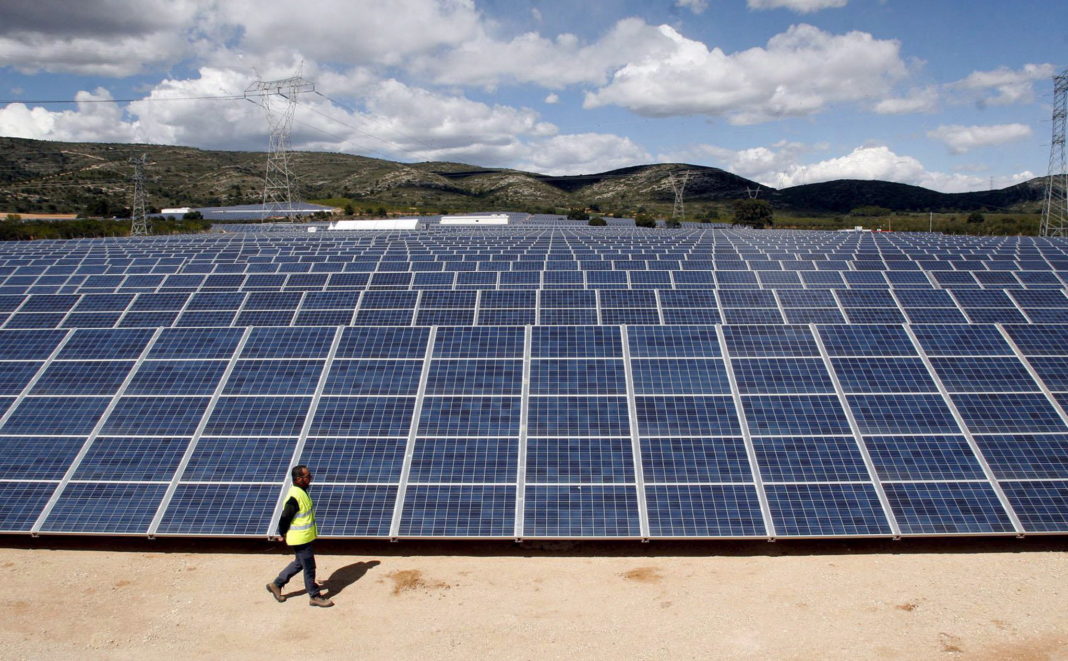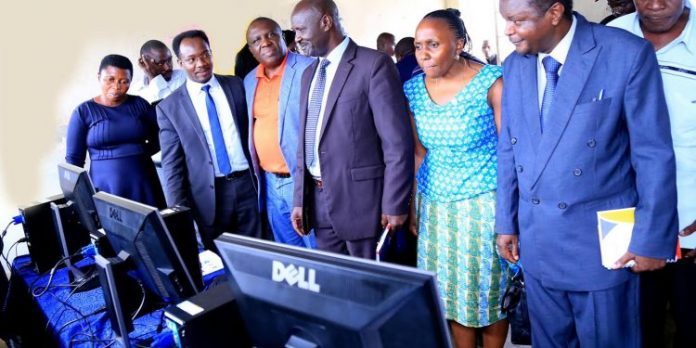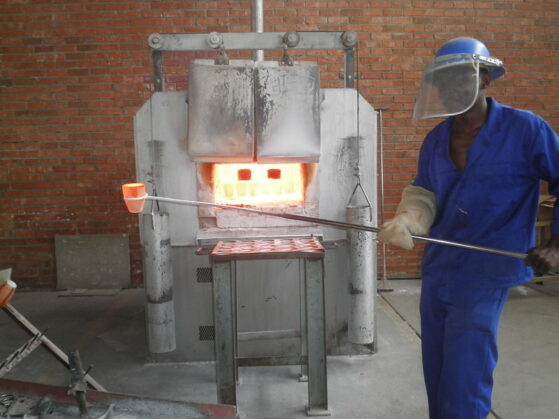Renewable news from East Africa.

Kenya gets energy investments record Sh145bn green.

Kenya attracted a record $1.4 billion (Sh145 billion) investments in renewable energy last year, the third highest in Middle East and Africa, deepening its shift from expensive sources of electricity.
The 2019 United Nations Environment Programed (UNEP) report that tracked global trends in renewable energy investments shows Kenya overtook Egypt, United Arabs Emirates, Jordan and Rwanda to join top six hotspots for green energy.
“Kenya saw investment of $1.4 billion in 2018, the highest on record, and split almost equally between geothermal at $486 million (Sh50.4 billion), wind at $476 million (Sh49.4 billion) and solar at $467 million (Sh48.5 billion),” says UNEP in the report.
Kenya trailed South Africa and Morocco who attracted $4.1 billion (Sh426 billion) and $3.1 billion (Sh322 billion) respectively. The largest deals in the country were $366 million (Sh38 billion) for the 83 megawatt (MW) KenGen Olkaria I unit 6 geothermal plant, and $333 million (Sh34.6 billion) for the 100MW Actis Kipeto wind farm.
Geothermal accounted for 44.6 percent of electricity generation mix at the end of December last year followed hydro at 29.8 percent. Thermal, which was at 24.5 percent in December 2017, dropped to just 9.6 percent.
The increased investments boost Kenya’s quest for cheap and clean energy given that for instance, wind power is priced at Sh8 per kilowatt hours (kWh) compared to thermal at Sh15 per kWh.
The 300MW Turkana Wind Power farm and Garissa solar power plant joined the grid last year, relegating expensive thermal power to fourth position in Kenya’s electricity sources.
Kenya also earned UNEP recognition for increased installation of small-scale solar systems. The 500kW project at Moi International Airport in Mombasa has been hailed as a first at an African air travel hub.
The UNEP report says that Middle East and Africa has some of the most promising markets for renewables, especially solar, due to year round sunshine and fast growth in electricity demand in most countries.
EIB presents two renewable energy projects in Kenya

The European Investment Bank and FMO, the Dutch entrepreneurial development bank, have announced on 24 September the joint financing of the construction of two new solar photovoltaic plants in Kenya.
They will each provide $53 million for the two projects, with the remainder of the $147 million total cost provided by the project promoters Frontier Energy, David Langat, chairman of the DL Group of Companies and Ayaz Merali, managing director of Paramount Bank.
The new Radiant and Eldosol plants are being built close to Eldoret, 300km north-west of Nairobi. The schemes will diversify the country’s electricity supply away from both rain-dependent hydro and fossil fuels. These green projects also fully align with FMO’s strategic goal to support the transition to a low-carbon system in Kenya
https://www.neweurope.eu/article/eib-presents-two-renewable-energy-projects-in-kenya/
Tullow oil extends solar powered computers to Uganda schools

Government Schools located in the oil rich Uganda Albertine region have benefited from Tullow Uganda Operations Pty Ltd, a donation of solar powered computer laboratories and a total of 70 computer pieces.
The beneficiary schools include; Ndandamire Primary school, Buliisa Primary school, Kaiso Primary school and Kyehoro Primary school in Buliisa and Hoima Districts.
While addressing a gathering at the opening ceremony dubbed Project Kuha, at Kaiso Primary school, Jimmy Mugerwa, the Managing Director Tullow Uganda, urged locals to provide and equip the younger generation with the right tools and skills that will prepare them for life in the digital era.
“The time is now, not tomorrow, to look at how ICT can be incorporated in our schools. Let us inspire pupils to be curious and interested in careers in the ICT world at an early age, mainly because they are the next generation of computer scientists and professionals,” he said. He said to achieve this, there is need to render support and equip teachers to effectively teach ICT in schools.
Mr Mugerwa applauded the Tullow Alumni Group Uganda (TAGU) which trained 65 teachers in computer literacy and these will in turn pass on this knowledge to over 3,500 pupils who are set to benefit from the company’s corporate social investment initiative.
The initiative comes on the backdrop of a survey that indicated that majority of the schools surveyed in Buliisa and Hoima districts did not have any computing facilities for both administrative and teaching purposes, largely because they could not afford to buy the equipment.
He added that; the project seeks to provide an enabling environment for use of ICTs in rural primary schools by providing an enabling environment, thereby promoting ICT education from early childhood and facilitating the mode of education through provision of computers to the pupils.
The computer labs were fitted with solar panels to ensure a more efficient way for the schools to meet their energy needs by using renewable energy whilst benefiting from low cost, low energy internet and IT access. Kadiri Kirungi, the chairman for Hoima District, commended Tullow Oil for their spirit that he said will help in fostering ICT skills in Uganda.
“This initiative is very much in line with the development agenda of the oil and gas sector and the National Oil and Gas Policy which provides guidelines for the use of our oil and gas to contribute to poverty eradication and create lasting value to society,” he said.
Tullow Uganda has invested over $5million in infrastructure projects in the oil-rich Hoima and Buliisa districts to support in the areas of health and education as part of its corporate social investment program.
https://www.cio.co.ke/tullow-oil-extends-solar-powered-computers-to-uganda-schools/
Africa’s oil may have to stay in the ground to protect the climate

As a result of climate change, resource extraction industries in Africa will be impacted by asset stranding, researchers say.
“Stranding implies that several natural assets are going to become commercially unviable around the world as a result of climate change and the inability of countries to exploit them,” said Vanessa Ushie, manager of the policy analysis division at the African Natural Resources Centre of the African Development Bank (AfDB), which supports African countries to leverage their natural resources for sustainable development.
Ushie told IPS stranding is an increasingly important policy issue that African countries should consider because they are highly dependent on natural resources, with an average 70 percent of their exports being minerals.
As the content struggles to reach its Sustainable Development Goals (SDGs), a set of global goals identified by the United Nations to end poverty and inequality among member states, a wealth of natural resources that could be used for Africa’s development remain largely untapped.
- Some 30 percent of the world’s mineral reserves including platinum, gold, diamonds and coal are found in Africa, yet the continent still has high levels of poverty.
- Africa also has 10 percent of the world’s oil reserves and 8 percent of natural gas, according to the African Development Bank.
- Climate change is threatening the exploitation of these resources and more importantly of the non-renewable energy sources; coal, oil and gas.
As a result of the impact of climate change, Africa has difficult options when it comes to its mineral resources, researchers say. Can it keep the resources in the ground and risk economic stagnation or find profitability in clean energy sources?
“We are aware of the Paris Agreement and the commitment of African countries, just like their global counterparts, to reduce carbon emissions in order to meet the target of keeping global warming below 2°Celsius,” Ushie said. “With that warming target, it is clear that certain minerals will have to be left below the ground especially those that emit the highest carbon into the atmosphere.”
Speaking at the end of the U.N. Climate Action Summit recently, Nobel Peace Prize laureate and former president of Ireland, Mary Robinson, said world leaders should act on the outrage of millions of people around the world who marched against climate change and calling for and end to the use of fossil fuels.
“We urge all nations to commit to achieving carbon neutrality before 2050 to immediately end construction of, and investment in, coal power and to implement a green transition that is just and equitable,” Robinson said.
Tanzania to develop 60 solar mini grids in rural areas
Tanzania is set to develop 60 solar mini grids in rural areas following CrossBoundary Energy Access (CBEA) signing an agreement with PowerGen Renewable Energy for the off-grid projects.
CBEA will provide US $5.5m for the development which will will provide quality electricity for the first time to 34,000 people in private homes and businesses in rural Tanzania. To ensure the financing of this project, CBEA signed a loan agreement with Renewable Energy Performance Platform (REPP), a development financing platform supported by the British government and managed by Camco Clean Energy. Such innovative project finance solutions will be key to unlocking the more than $11 billion for mini-grids needed from investors to connect at least 100 million people.
Tanzania’s sunshine hours per year range between 2,800 and 3,500 with global horizontal radiation of 4–7kWh per m2 per day. To date, about 5.3MWp of Photovoltaic (PV) solar energy have been installed in Tanzania. The Government supports solar development within the country by removing VAT and import taxes on the main solar components (panels, batteries, inverters, and regulators).
https://constructionreviewonline.com/2019/07/tanzania-to-develop-60-solar-mini-grids-in-rural-areas/
How complex land rights affect crucial projects

Title deed. In Kenya it is not unusual for disputes to arise where the community is concerned over what it considers to be poor compensation for land, the effects of projects on the community and the perception of meagre benefits from infrastructure projects. FILE PHOTO | NMG
Recently, Kenya has initiated a number of infrastructure-related investments, majority of which focus on transport and energy. This, coupled with the country’s potential for scalable renewable energy projects, strongly positions the country to play an instrumental role in the African energy market.
For many of these types of projects, however, issues relating to land have cast a dark shadow on their actualization.
Being an integral part of any infrastructure project, the complex and bureaucratic processes associated with its acquisition, disagreements over its compulsory acquisition and cancellation of titles over irregular ownership are now becoming more commonplace.
To allay investors’ fears, this is what needs to be done.
First, and perhaps the most significant issue, the Land Control Act makes it mandatory for parties to obtain this consent for sale, transfer, lease, charge and subdivision of agricultural land, which includes land not within a municipality or township.
Given the land-intensive nature of energy infrastructure projects, most project sites are located in rural areas invariably making the land agricultural.
11 October 2019





